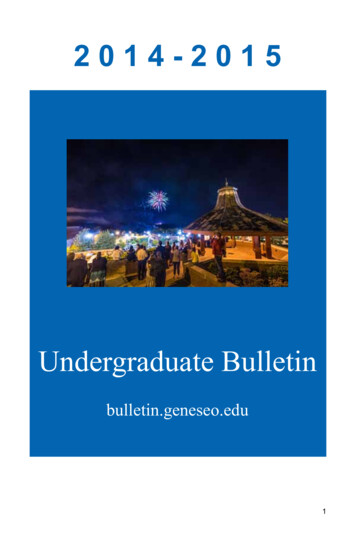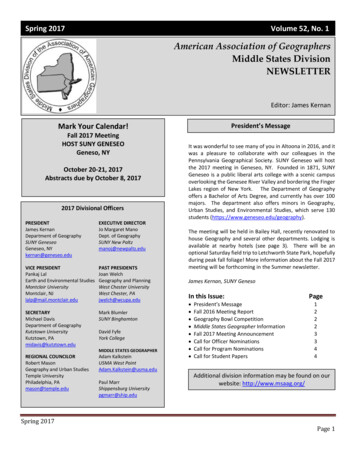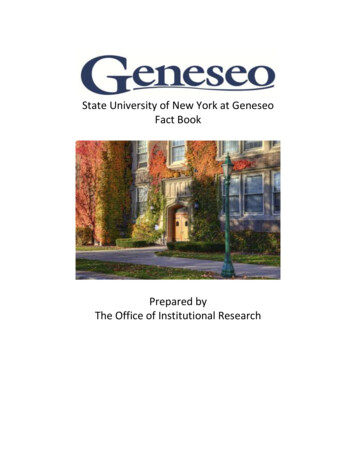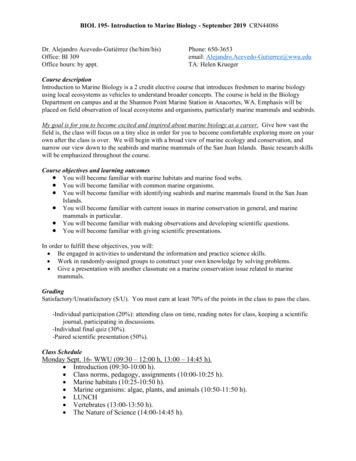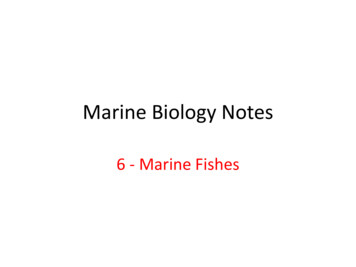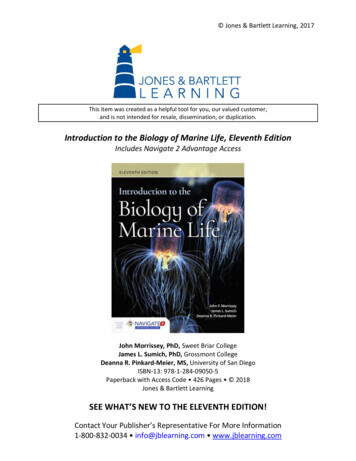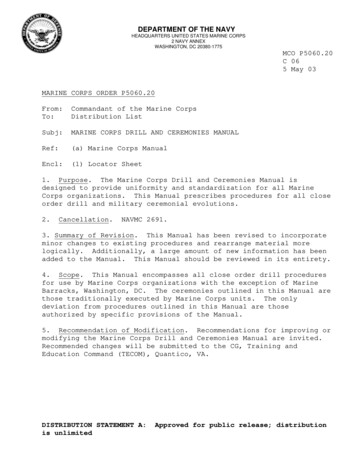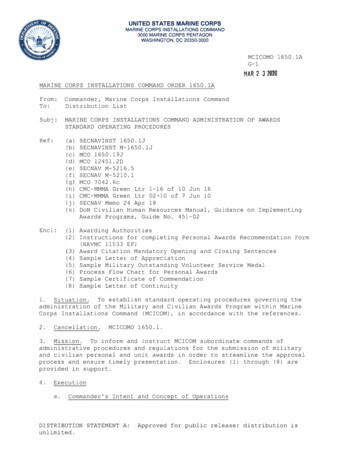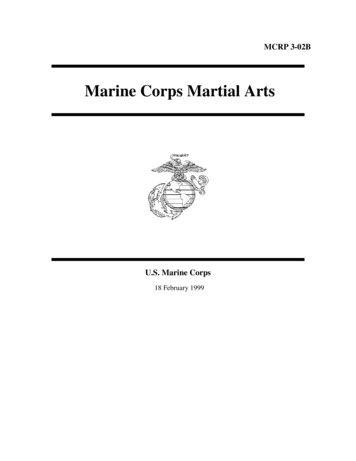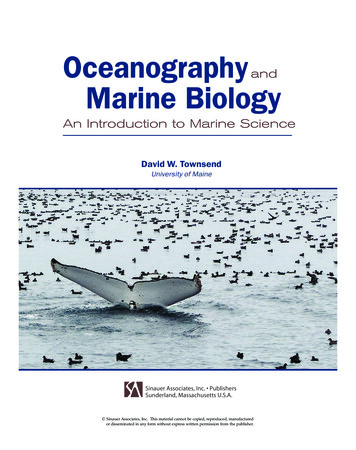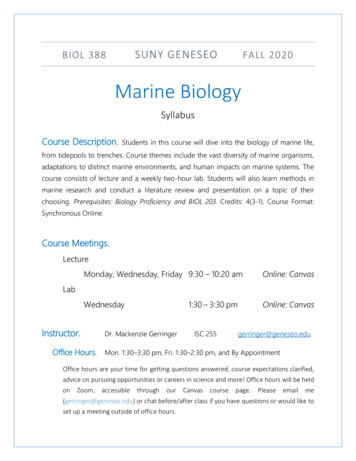
Transcription
SUNY GENESEOBIOL 388FALL 2020Marine BiologySyllabusCourse Description.Students in this course will dive into the biology of marine life,from tidepools to trenches. Course themes include the vast diversity of marine organisms,adaptations to distinct marine environments, and human impacts on marine systems. Thecourse consists of lecture and a weekly two-hour lab. Students will also learn methods inmarine research and conduct a literature review and presentation on a topic of theirchoosing. Prerequisites: Biology Proficiency and BIOL 203. Credits: 4(3-1). Course Format:Synchronous Online.Course Meetings.LectureMonday, Wednesday, Friday 9:30 – 10:20 amOnline: CanvasWednesdayOnline: CanvasLabInstructor.1:30 – 3:30 pmDr. Mackenzie GerringerISC 255gerringer@geneseo.eduOffice Hours. Mon. 1:30–3:30 pm, Fri. 1:30–2:30 pm, and By AppointmentOffice hours are your time for getting questions answered, course expectations clarified,advice on pursuing opportunities or careers in science and more! Office hours will be heldon Zoom, accessiblethrough our Canvascourse page.Please email me(gerringer@geneseo.edu) or chat before/after class if you have questions or would like toset up a meeting outside of office hours.
Learning Outcomes.During this course, we will: Explore the biodiversity of marine systems across broad taxonomic and habitatranges.Understand adaptation into the marine environment at molecular, organismal, andcommunity levels.Develop and practice strategies for reading and critiquing scientific journal articles.Engage in critical thinking and discussions about human impacts on marine systems.Research, synthesize, and present scientific information effectively through writtenand oral projects in the classroom and lab.How this course fits into your biology education.This course will help you work toward the following Biology Program Learning Outcomes: 1. Students will have the knowledge base and intellectual (conceptual) framework to usereasoning and problem-solving skills to; (1) read critically, (2) evaluate support forcompeting hypotheses, and (3) critique experimental design. Level: Reinforcement. 2. Students will have the laboratory and inquiry skills and technical ability to formulatehypotheses, design and run experiments using instruments to test their hypotheses, andanalyze and interpret the results. They will be able to build on earlier work to design furtherexperiments. Level: Introduction. 3. Students will be able to communicate biological ideas from literature or their ownlaboratory investigations to audiences of biologists and non-biologists in a variety offormats including written reports, poster and oral presentations. Level: Reinforcement. 4. Students will recognize the importance of scientific integrity and ethical research andapplications of biology to science policy. They will be able to work independently and inteams for life-long learning. Level: Reinforcement. 5. Students will be able to demonstrate a broad and diverse background in biology andrelated sciences and a strong foundation for graduate and professional programs of studyor employment. Level: Reinforcement. 6. Students will recognize evolution as the central tenet of biology, which explains theunity and diversity of life and interrelatedness of levels of biological organization. Level:Reinforcement.
Course Materials.Textbook: Marine Biology: Function, Biodiversity, Ecology. JeffreyLevinton, 5th Edition, 2017. Older editions may also be used. RedShelf offers a digital rentalof the text for 60. Corresponding readings for lecture topics are provided in the schedule.Scientific Papers. We will also explore current research in marine biology. These readings areavailable on Canvas. Article response worksheets will help you develop strategies for readingscientific papers. Please submit these article responses for three of the four readings. Forone reading, we will have a mini-journal club to discuss the studies, questions we comeacross, and what we’d do next to advance the field.Course Technology. Additional materials will always be available on Canvas for those lookingto dive deeper into these topics. We have discussion threads for questions about the course,material, or research opportunities. If you see internship opportunities or neat marinescience news, please share! We will also be learning and using some common tools foraccessing and analyzing marine data, including R. All software will be freely available todownload, with links provided on Canvas.Course Expectations.Much of the value of this course will come from our in-class activities and discussions.Therefore, online attendance is expected when possible and active participation will be partof your course grade. If you cannot join a synchronous class session, please plan onparticipating in our discussions on Canvas and/or completing an alternative reading andresponse. Please reach out to me to discuss potential or needed extended absences. Theearlier you get in touch about questions or concerns, the more options we will have.Assignments & Grading.Course grades will be based on participation in class, reading responses, projects, labactivities, and exams, designed to be inclusive for different learning styles and help you trackyour progress. Assignment summaries are included below, with further assignment detailsand rubrics provided on Canvas and in class throughout the semester. Please feel free toreach out if there are questions about grading policies and course expectations. Coursescores total 300 points.
Article Responses15% of course gradeFour scientific journal articles will supplement our textbook reading. For threeof these, write a short response on the worksheet provided (10 points each).For one other article, meet with the instructor in groups of three for a short( 15 min) journal club discussion on the reading (15 points).Choy et al. 2017Sept. 11thBreitburg et al. 2018Sept. 25thNakaya et al. 2020Oct. 9thDavis et al. 2020Oct. 30thTopic Presentation15% of course gradePrepare a talk on a topic in marine biology that excites you. Submit a topicproposal (10 points) and a presentation outline (10 points) for feedback. Talkswill be given in class, 11/2–11/6 (25 points). Slides are due via Canvas at 9 amon 11/2.Topic ProposalPresentation OutlineTopic PresentationSept. 18th10 pointsrd10 pointsnd25 pointsOct. 23Nov. 2Human Impacts Poster10% of course gradeHow will you share your marine science expertise beyond the classroom?Create an eye-catching, informative poster to communicate one humanimpact on marine systems to a public audience. Alternatively, you maycommunicate an example of bioinspiration from the marine realm. You maywork individually or in pairs. For individuals, please cite three scientific sources,for pairs, use six sources (30 points).Optional Topic CheckNov. 11thHuman Impacts PosterNov. 23rdLab30 points20% of course gradeFor our first month, each lab will have a corresponding worksheet withquestions to synthesize the material (5 points each). Lab worksheets are duethe following Wednesday at 5 pm.
Lab Activity 1Sept. 9th5 pointsLab Activity 2Sept. 16th5 pointsLab Activity 3Sept. 23rd5 pointsLab Activity 4Oct. 2nd5 pointsFor our remaining labs, we will conduct an original research project in marinebiology. We will work collaboratively, and rely on the contributions ofeveryone to complete the research. Each individual will be graded on theirresearch contribution (10 points), a figure you generate from our data (10points), and your contribution to our lab research paper. Further details onexpectations will be provided as the project progresses. This is an opportunityfor us to do real marine science together this semester.Research ContributionResearch FigureNov. 18th10 pointsnd10 pointsth20 pointsDec. 2Lab Research PaperDec. 9Exams30% of course gradeExams will cover the material presented in class and the text-book to track ourprogress and synthesize our understanding. Mid-Term, 15%. The mid-termexam will be held on Monday, October 14th (40 pts). You will have a choice offormat for the mid-term exam: oral or written. Both formats will be closedbook. Final, 15%. The final exam will an open-book synthesis of our coursematerial and will be due on Friday, December 18th, 3:30–6:00 pm (50 pts). Wewill have open review sessions in class before each exam.Mid-Term ExamOct. 14th40 pointsFinal ExamDec. 18th50 pointsParticipationEvery Class10% of course gradeEarn full participation credit by engaging with in class activities and discussions(30 points). Asking questions, sharing your insights during class discussions,engaging with lab activities, and posting on Canvas discussions are all ways toactively participate in this course.
Resources & Policies.Course Policies. Late assignments and make-up assignments will be accepted only withextenuating circumstances. If you have an emergency or foresee a scheduling conflict on anassignment exam, please contact me as soon as possible and we’ll work something out ona case-by-case basis.Marine Science Resources. Further readings, activities, career and internship opportunitieswill be available on the Canvas page. Please check the course page for these resources anddo not hesitate to reach out if you have questions about the material or want to know moreabout a topic.Useful Links for Marine Science.Review of Latitude & Longitude: 433521Real-Time Visualization of Winds and Currents: https://earth.nullschool.net/National Data Buoy Center Resources: http://www.vos.noaa.gov/mwl.shtmlThe Argo Float Network: http://www.aoml.noaa.gov/phod/argo/how argo works.phpNOAA Okeanos Explorer Live Feed .htmlOcean Networks Canada, Data and Resources: http://www.oceannetworks.ca/Ocean Observatories Initiative: https://oceanobservatories.org/Hawaii Ocean Time Series, 30 years of Oceanographic Data: http://hahana.soest.hawaii.edu/hot/Understanding Climate Change: gov/gistemp/news/Geneseo Mission and Values. SUNY Geneseo has several core documents that articulate our sharedcommitments and learning objectives. These include: SUNY Geneseo Mission, Vision and Values: lues Community Commitment to Diversity, Equity, and ment Geneseo Learning Outcomes for Baccalaureate emic Support Services. The campus provides a range of support services to help students thrivein their classes. These services include: Tutoring, both drop-in and by-appointment, with student
tutors in the Writing Learning Center, the Math Learning Center, and a range of department-basedtutoring centers Online tutoring through the SUNY-wide STAR-NY system(www.starny.org/tutoring schedule)Supplemental Instruction, in which trained student assistants review lecture material fromspecific classes. Information on times and locations is available through the Center forAcademic Excellence website at Additionally, the college offers a number of peer mentoring programs that are designed to reinforcegood academic habits. These include: Academic Peer Mentors in the Office of Academic Planning and Advising provide studentswith promising study strategies and can host on-going appointments with students seekingan "accountability buddy". More information is available at:https://www.geneseo.edu/dean office/academic-peer-mentors-0. The ONYX Academic Success workshop series sponsored by the GOLD Leadership Programintroduces students to a variety of study skills, time management techniques, and instructionon how to access campus resources for academic and career guidance. A full list of GOLDworkshops can be accessed at https://www.geneseo.edu/gold/app/browse. Tutoring, both drop-in and by-appointment, with student tutors in the Writing LearningCenter, the Math Learning Center, and a range of department-based tutoring centersLibrary Research Help. Geneseo's Library staff has created online research guides, self-helpdatabases, and are available for individual consultation. Research Librarians are available for walk-inconsultations and students may request appointments with staff experts in particular fields. Fullinformation on library research resources, hours, and consultation options is availableat www.geneseo.edu/library/ask-us. Students, faculty, and staff will be able to schedule researchconsultations with librarians via Zoom or another medium, using the same link as in past s In lieu of in-person drop-in hours, the librarians arestaffing LibChat, a service that allows for online, chat-based synchronous communication. LibChat isavailable Mondays–Fridays. Access it by clicking on the green owl icon, which is located throughoutthe library website. While electronic resources will continue to be accessible, Milne's physicalcollection will have limited access. Faculty, staff, and students are encouraged to use IDS to borrowmaterials from other libraries. For information about IDS and library services as a whole, seegeneseo.edu/library/library-service-information The librarian for our course is Dr. Jonathan Grunert,grunert@geneseo.edu.Academic Integrity and Plagiarism. The library offers frequent workshops to help studentsunderstand how to paraphrase, quote, and cite outside sources properly. With your Topic Proposalsubmission, you’ll be asked to complete the Avoiding Plagiarism Tutorial on Canvas to help clarifyexpectations. These sessions are meant to educate about the importance of using original ideas andlanguage, and how to incorporate paraphrases and quotes into writing. The complete list of libraryworkshops can be found at www.geneseo.edu/library/library-workshops.
Academic dishonesty includes cheating, knowingly providing false information, plagiarizing, and anyother form of academic misrepresentation, including self-plagiarism. Academic dishonesty will notbe tolerated in this course. College policies and procedures regarding academic dishonesty areavailable at y.Computer and Technology Support. To help reduce the spread of COVID-19, the CIT HelpDesk willnot be available for walk-in appointments this fall semester. Contact us at 585-245-5588 and ourHelpDesk technicians will help you over the phone or schedule a follow-up appointment if necessary.Individuals looking to borrow equipment such as video adapters, cameras, projectors, and laptopswill be able to do so from the Library Service Desk.Getting Help from CIT. For the fastest response to technical questions or issues, please call the CITHelpDesk at 585-245-5588. If you are unable to reach us by phone, please leave a voicemail, and wewill follow up within one business day. You can also submit a ticket through the CIT Service DeskPortal. If you prefer, for non-critical issues, you may also submit a ticket via email athelpdesk@geneseo.edu.For assistance with your computer or mobile device, visit the CIT HelpDesk in Fraser. CIT providesself help guides on a range of computer issues, including access to the campus network, Canvas,printing, software guides, and other resources. The CIT Self Help Guidesat wiki.geneseo.edu/display/cit/CIT Self Help can be helpful in finding quick solutions to basictechnology issues.Geneseo students, faculty and staff have FREE access to the entire LinkedIn Learning traininglibrary (over 7,500 courses, including tutorials for software, digital tools, web development,programming, and design) through Geneseo's site license. For more information, visit this wiki n Learning Training Library)Course Accessibility. SUNY Geneseo is dedicated to providing an equitable and inclusive educationalexperience for all students. The Office of Accessibility will coordinate reasonable accommodationsfor persons with documented physical, emotional, or cognitive disabilities, as well as medicalconditions related to pregnancy or parenting. Students with letters of accommodation should submita letter to each faculty member at the beginning of the semester and discuss specific arrangements.Please contact the Office of Accessibility Services for questions related to access andaccommodations.Office of Accessibility ServicesErwin Hall 22(585) ility-officeAll course materials are available on Canvas and I’ve made every attempt to ensure that they areaccessible to everyone. If you have difficulties accessing any materials (including needs for alternativeformats), please let me know as soon as possible and I will rectify the situation.
Attendance at “Live” or “Synchronous” Online Sessions. Accessing course materials online may bechallenging—we’ve all experienced things like unforeseen emergencies and internetdisruptions. Although this course centers on “live” or synchronous course activities, we can all beunderstanding about the challenges posed by the COVID-19 pandemic and the limits of technology.If you miss a synchronous session, please let me know as soon as possible so that we can discussways to keep you on track. If you are experiencing longer-term disruptions, please be proactive incommunicating with me and contact the Dean of Students if you expect to be out for an extendedperiod of time.Getting Help with Online Classes. CIT has developed a number of resources that can help youformulate good strategies for success in online courses. These include general strategies for keepingon track with your courses as well as more specific resources about learning experiences that youmay encounter in an online course. The Office of the Dean for Academic Planning and Advising hasalso introduced the new KOALA (Knights’ Online Academic Learning Assistance) course supportresource. Throughout the semester, if you need help with online learning strategies, you can contactthe KOALA support desk, which will assist you with identifying resources and strategies for success.CIT also provides a range of technology support resources. When you are in Canvas, the Help menuon the left side of the screen will also direct you to a number of CIT supports, including self-helpresources and options to request technology assistance.Religious Observations and Class Attendance. Student attendance in classes on religious holidays isgoverned by New York State Education Law 224-a (see https://www.geneseo.edu/apca/classroompolicies). Students who anticipate an absence due to religious observations should contact theirfaculty member as soon as possible in advance to arrange make up plans.Bias-Related Incidents. “We are here to listen, to learn, to teach, to debate, to change, to grow. Weshould all be safe to pursue these goals at SUNY Geneseo while being who we are. Together, wecommit ourselves to pluralism, cultivating a community that respects difference and promotes asense of inclusion and belonging.”As this excerpt from our Community Commitment to Diversity, Equity, and Inclusion states, here atSUNY Geneseo, we want to provide a space where everyone feels welcome to learn and grow intheir identities as well as in their role as students, faculty, and staff. If in the unfortunate instance youexperience an incident of bias, we encourage you to reach out to the Chief Diversity Officer(routenberg@geneseo.edu) and/or our University Police Department. In trying to create anenvironment that facilitates growth through diverse thoughts and ideas, reporting incidents of bias—including threats, vandalism, and microaggressive behaviors—can help bring a better understandingof our campus climate as well as provide opportunities for learning and restoring harm. Hatefulspeech or actions will not be tolerated in our class.Student Well-Being is a priority in this class, to support the achievement of academic goals andalleviate stress. Eating nutritious foods, getting enough sleep, exercising, avoiding drugs and alcohol,maintaining healthy relationships, and building in time to relax all help promote a healthy lifestyleand general well-being. Concerns about academic performance, health situations, family health andwellness (including the loss of a loved one), interpersonal relationships and commitments, and other
factors can contribute to stress. Students are strongly encouraged to communicate their needs tofaculty and staff and seek support if they are experiencing unmanageable stress or are havingdifficulties with daily functioning. Please feel free to reach out to me if you have questions orconcerns. The Dean of Students (585-245-5706) can also assist and provide direction to appropriatecampus resources. For more information, see www.geneseo.edu/dean students.Mental Health Resources. As a student, you may experience a range of challenges that can impactyour mental health and thus impact your learning; common examples include increased anxiety,shifts in mood, strained relationships, difficulties related to substance use, trouble concentrating, andlack of motivation, among many others. These experiences may reduce your ability to participatefully in daily activities and affect your academic performance.SUNY Geneseo offers free, confidential counseling for students through the Lauderdale Center forStudent Health and Counseling, and seeking support for your mental health can be key to yoursuccess at college. You can learn more about the various mental health services availableat health.geneseo.edu.Health and Wellbeing in a Stressful Time. The changes brought on by COVID-19 have impacted us allin a number of ways, and will continue to do so at various times and to varying degrees during theupcoming semester. Your health and wellbeing are foundational to your ability to learn, and if youfind that you are feeling unwell (physically or mentally) and it is impacting your ability to completeyour coursework, please reach out. Because the learning environment will be different than it hasbeen in the past, the indicators that usually let you know something is wrong may not be as clear toyou or those around you as they would be during a typical semester. Additionally, the ways in whichyou normally engage in self-care may have been disrupted. Please remember that it’s never too lateto ask for help. The Dean of Students (585-245-5706) can assist and provide direction to appropriatecampus resources. The college also has collected resources in a Coping with COVID webpage.In a similar way, I may occasionally ask for some patience and flexibility on your part. The pandemicis affecting faculty as well as students and creating demands that would not be present in an ordinarysemester. You will never suffer any disadvantage in the course because of delays on mypart. Remember that we are all in this together.Parents. Students who are parenting will be supported in this class. I ask that all students work withme to create a welcoming environment that is respectful to all forms of diversity, including diversityin parenting status. All exclusively breastfeeding babies are welcome in our class sessions as often asis necessary. For older children and babies, I understand that unforeseen disruptions in childcare andpandemic-related changes often put parents in the position of having to miss class to care for achild. While not a long-term childcare solution, occasionally bringing a child to class to cover gapsin child care is perfectly acceptable. If babies and children come to class, I ask that you be mindfulof your video and microphone on Zoom to avoid disrupting learning for other students. Finally, Iunderstand that often the largest barrier to completing your coursework as a parent is the tirednessmany parents feel in the evening once children have gone to sleep. While I maintain the same highexpectations for all students in my classes regardless of parenting status, I am happy to problemsolve with you in a way that makes you feel supported as you strive for school-parenting balance.
Food Security. SUNY Geneseo students who find themselves in a position of food insecurity and donot have the financial resources to support their food and nutrition needs can access the GeneseoGroveland Food Pantry located at the First Presbyterian Church, 31 Center Street in Geneseo.Students can utilize the pantry once with no referral or contact with the College. At this visit they willbe provided items that will address their basic needs for several days. If a student continues to facedifficulties providing for their own nutritional needs beyond their first visit to the pantry they shouldconnect with Susan Romano, Director of Financial Aid to receive a brief letter that they will presentto the staff at the pantry that verifies their need. If students do not have a FAFSA on file for anyreason they should contact Dr. Leonard Sancilio, Dean of Students, to discuss their particular situationand options. The Geneseo Groveland Food Pantry is open on the following days and times:Tuesday: 10 AM–2 PMWednesday: 4 PM–6:30 PMThursday: 10 AM–2 PMIf you have any questions please contact Dr. Leonard Sancilio, Dean of Studentsat: sancilio@geneseo.edu or 585-245-5706.US Election Day. Please note that Tuesday, November 3rd is Election Day in the US. Due to thepandemic, mail-in voting is the safest way for you to vote in the 2020 election. Most states alreadyhave mail-in voting in place, without a need for an excuse (or COVID-19 is an acceptable excuse).Visit vote.gov to register and for further information.
BIOL 388: MARINE BIOLOGYSCHEDULEWeek 1: Our Blue PlanetAug. 31Welcome to Marine BiologySept. 2The OceansSept. 2Lab 1: Our Blue PlanetSept. 4Properties of SeawaterCh. 1: 1–11Ch. 2: 12–17Week 2: OceanographySept. 7Labor Day, No ClassesSept. 9Currents, Waves, & TidesSept. 9Lab 2: Winds & WavesCh. 2: 21–32Due: Lab 1 ActivitySept. 11A Brief History of Marine BiologyDue: Article Response: Choy et al. 2017Week 3: Marine ResearchSept. 14Methods of Marine ResearchSept. 16Marine EcologySept. 16Lab 3: Oceanography in RCh. 4: 46–73Due: Lab 2 ActivitySept. 18Productivity & Food WebsCh. 12: 239–254Due: Talk Topic ProposalWeek 4: Changing OceansSept. 21Climate ChangeIPCC Report for Policy MakersSept. 23Changing OceansSept. 23Lab 4: Climate Change & Ocean AcidificationDue: Lab 3 ActivitySept. 25Discussion: Climate Change & EcoanxietyCh. 3: 33–45
Due: Article Response: Breitburg et al. 2018Week 5: Marine OrganismsSept. 28Marine MicrobesCh. 8: 145–149, Ch. 13: 256–267Guest Speaker: Dr. Logan PeoplesSept. 30No ClassesOct. 2Marine ZooplanktonCh. 8: 149–158Due: Lab 4 ActivityWeek 6: Marine OrganismsOct. 5Marine InvertebratesCh. 9: 159–161; Ch. 14: 268–295Oct. 7Marine FishesOct. 7Lab 5: Introduction to Our Class Research ProjectOct. 9Mammals, Birds, & ReptilesCh. 9: 161–171Ch. 9: 171–188Due: Article Response: Nakaya et al. 2020Week 7: Marine HabitatsOct. 12Mid-Term ReviewOct. 14Mid-Term ExamOct. 14Lab: Class Research ProjectsOct. 16Benthic EcologyCh. 15: 297–316Mid-Term EvaluationsWeek 8: Marine HabitatsOct. 19Pelagic EcologyOct. 21The IntertidalOct. 21Lab: Class Research ProjectsOct. 23Coral ReefsCh. 10: 189–196; 201–210Ch. 16: 317–341Ch. 17: 382–408Due: Topic Presentation OutlineWeek 9: Marine HabitatsOct. 26Seagrasses, Kelp Forests, Mangroves Ch. 16: 341–364; Ch. 17: 365–382Oct. 28The Deep SeaOct. 28Lab: Class Research ProjectsCh. 18: 409–433
Oct. 30Polar SeasCh. 19: 434–444Guest Speaker: Dr. Amanda ZieglerDue: Article Response: Davis et al. 2020Week 10: Topic PresentationsNov. 2Topic PresentationsDue: All Topic Presentation SlidesNov. 4Topic PresentationsNov. 4Lab: Class Research ProjectNov. 6Topic PresentationsWeek 11: Marine Life CyclesNov. 9Reproduction in the OceanCh. 7: 109–126Nov. 11Life History & GrowthCh. 7: 126–144Optional: Human Impacts Poster TopicNov. 11Lab: Class Research ProjectNov. 13Movement of Marine OrganismsCh. 10: 197–201Week 12: Human Impacts on the Marine EnvironmentNov. 16Human ImpactsCh. 22: 504–529Nov. 18Marine BiodiversityCh. 20: 445–470Nov. 18Lab: Data Analysis for Class Research ProjectNov. 20Marine ConservationCh. 21: 471–502Week 13: Review & Check-InNov. 23Review & Check-InDue: Human Impacts PostersNov. 25–27Thanksgiving Break – No ClassesWeek 14: Marine PhysiologyNov. 30Salinity & OxygenCh. 5: 86–92Dec. 2Temperature & PressureCh. 5: 74–85Dec. 2Lab: Our Research Paper: Writing WorkshopDue: Research Project Figure
Dec. 4Light & VisionCh. 5: 92–97Week 15: Life in a Fluid MediumDec. 7Fluid Dynamics & Marine OrganismsCh. 6: 98–101Dec. 9Life in a Fluid MediumCh. 6: 101–108Dec. 9Lab: Wrap-Up on Class Research ProjectDue: Lab Research PaperDec. 11Sound in the SeaWeek 16: Putting it TogetherDec. 14Putting it Together: Final ReviewDec. 18Due: Final Exam
adaptations to distinct marine environments, and human impacts on marine systems. The course consists of lecture and a weekly two-hour lab. Students will also learn methods in marine research and conduct a literature review and presentation on a topic of their choosing. Prerequisites: Biology Proficiency and BIOL 203. Credits: 4(3-1).
